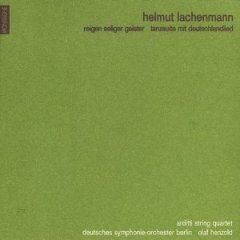Helmut Lachenmann - Reigen seliger Geister · Tanzsuite mit Deutschlandlied
Helmut Lachenmann - Reigen seliger Geister · Tanzsuite mit Deutschlandlied

1. II. Streichquartett 'Reigen Seliger Geister'
2. Tanzsuite Mit Deutschlandlied: Section I: Preambule
3. Tanzsuite Mit Deutschlandlied: Section I: Intro
4. Tanzsuite Mit Deutschlandlied: Section I: Valse
5. Tanzsuite Mit Deutschlandlied: Section I: Marche
6. Tanzsuite Mit Deutschlandlied: Section I: Transition
7. Tanzsuite Mit Deutschlandlied: Section II: Sicilienne play
8. Tanzsuite Mit Deutschlandlied: Section II: Capriccio
9. Tanzsuite Mit Deutschlandlied: Section II: Valse Lente
10. Tanzsuite Mit Deutschlandlied: Section III: Transition
11. Tanzsuite Mit Deutschlandlied: Section III: Gigue
12. Tanzsuite Mit Deutschlandlied: Section III: Tarentelle
13. Tanzsuite Mit Deutschlandlied: Section III: Transition
14. Tanzsuite Mit Deutschlandlied: Section IV: Aria I
15. Tanzsuite Mit Deutschlandlied: Section IV: Polka
16. Tanzsuite Mit Deutschlandlied: Section IV: Aria II
17. Tanzsuite Mit Deutschlandlied: Section V: Intro
18. Tanzsuite Mit Deutschlandlied: Section V: Galop play
19. Tanzsuite Mit Deutschlandlied: Section V: Coda (Aria III)
Arditti Quartet
Berlin Radio Symphony Orchestra
Olaf Henzold – conductor
A vicious anti-masterwork, nationalistic and anarchist at once, caught between attacking great art and being great art, Lachenmann's nearly 40-minute Tanzsuite mit Deutschlandlied from 1980 is a problem-piece. Everything it does it also counters: it structures and then defaces old dances; it sets and then obliterates old tunes; it fashions wildly bewildering climaxes and then pulverizes them to a formal dust which extends far beyond reasonable frames. In this sense the Tanzsuite is the self-canceling apotheosis of Lachenmann's masochistic streak. But in the process, one perceives the alchemical magic of Lachenmann's methods and means: this monumental agon, even as it goes for its jugular, seems to give up a ghost, or send a spirit screaming into the hall to relay a message. And in retrospect the scope of the message -- embracing a musical history (of Haydn, Bach, folk tunes) and a political one (of Hitler and Nazism) -- seems disquietingly well-served through this music, which both smothers a terrible secret and, through its spectacularly fractured surface, lets it bleed through to stain the stage.
Lest one moralize too much, the Tanzsuite is also a great thrill, at least for the gracious listener: few have as gruesomely effective a sense of timing and (dark) humor as Lachenmann, and absolutely no one writes for the orchestra like him. At its fullest, as in the middle gigue and tarantella, the orchestra creates such a vivid maelstrom of noises as to render the traditional ensemble sound a farce: here, in this clamor as precise and sharp as a bed of nails (and as messy as the back upon it), we hear snatches of a direct presence rare in music, certainly in of recent times.
The general structure of the work functions much like other Lachenmann scores: the series of dances (waltzes, marches, sicilianos, galops, even a polka) are not forms to be filled but rather fields to be infested. Scratching, blowing, tearing, rubbing, sliding, and all other manner of instrumental mis-use invades and scribbles against the rhythmic profiles of each characteristic dance rhythm; likewise, when the actual German National Anthem does show up, it's barely recognizable amidst the distortions and disfigurings with which Lachenmann has dispersed its bytes throughout the orchestra.
But whatever titillation the piece offers you, it also manages to threaten that titillation with the sense of a looming specter. German history is written large over any piece after WWII endeavoring to use the German national anthem, and Lachenmann's meticulous brutalization of the music refuses any compromise. Hence the string quartet in front of the orchestra, its nerve-center: the anthem began as a cozy emblem of that genre which the nineteenth century equated with transcendence itself, the innocent slow movement of Haydn's "Emperor" Quartet. That such music found its way into the hands of Nazis who performed it for themselves in the camps is only one bitter irony that glows over this bitter score. ~ Seth Brodsky, Rovi








